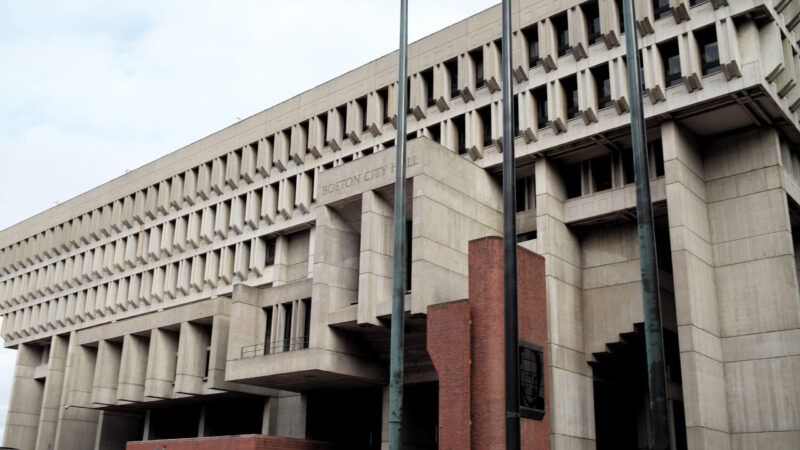Should a Christian Group Be Allowed To Fly a Flag Outside Boston City Hall?
The Supreme Court will soon decide a case that tests the limits of expression on government property and religious toleration.

For more than 12 years, Boston flew three flags in front of its city hall. The first was the United States flag, followed by the Massachusetts state flag. For the third, Boston usually raised its city flag.
On certain occasions, however, the city would allow local groups to temporarily raise their own flags in the coveted final spot. Flags from such groups as the Chinese Progressive Association and Boston Pride flew for a time, as well as the flags of almost a dozen countries, raised by local cultural organizations.
Over 12 years, Boston approved 284 flag-raising applications—and denied just one.
In July 2017, Christian civic group Camp Constitution, which hosts a yearly patriotic family camp designed "to enhance understanding of our Judeo-Christian moral heritage," applied to raise a "Christian flag" for one hour, during which the group planned to hold "short speeches by some local clergy focusing on Boston's history" around the flagpole.
At the time, Boston had no written policy for evaluating these applications. Despite the lack of guidance, a city official rejected Camp Constitution's request. His reasoning: The prominent religious imagery "concerned" him, and he believed raising the flag could violate the Establishment Clause of the U.S. Constitution.
The group sued but lost in a lower court. Eventually Shurtleff v. Boston made its way to the U.S. Supreme Court, which may be poised to rule against the city.
Several justices appeared skeptical of Boston's claims during oral arguments in January. "When you say anybody can speak by putting up a flag," Justice Samuel Alito pointedly asked the city's lawyer, "are you not creating a forum for private speech rather than speaking your own mind?" Justice Brett Kavanaugh went further, remarking that at the root of the city's position "is a mistaken view about the Establishment Clause."
While the latest developments seem promising for Camp Constitution, the legal precedent in this case is murky. In the 2015 case Walker v. Texas Division, Sons of Confederate Veterans, the Court ruled that specialty license plates are government speech—and thus that Texas was not required to approve a group's request to create a plate bearing the Confederate battle flag. In 2017, however, the Court sided with an Asian-American dance-rock band provocatively called The Slants, ruling that the government cannot deny trademarks for "disparaging" names.
The outcome of this case turns on whether the Court will decide that Boston's flagpole was functioning as a "designated public forum"—public property that the government is not obligated to open for free expression but has nonetheless designated for that purpose—or as a form of government speech. If the former, it is likely to find that Camp Constitution was the victim of unlawful viewpoint discrimination. If the latter, it is likely to side with the city on the grounds that the government is barred from unduly favoring one religion or another.
Yet as the American Civil Liberties Union (ACLU) wrote in an amicus brief filed on the case, "When the government creates a public forum, it generally does not violate the Establishment Clause merely to allow religious speakers to use the forum on the same terms that apply to non-religious speakers."
In fact, equal access to public forums is constitutionally required, and Boston's challenge to that right should trouble anyone who values free expression. As ACLU National Legal Director David Cole told ABC News, "This case is really about private citizens' access to government property to express themselves. And that access is critical to our ability to speak to each other, to express our views and the like." Camp Constitution is entitled to raise its flag, in other words, regardless of the group's religious nature.
If the Court decides that Boston's flag-raising program does not constitute a public forum, it will be giving the city permission to discriminate at will. The outcome of this case will therefore help determine whether state actors can use the Establishment Clause as justification for violating religious groups' First Amendment rights for years to come.


Show Comments (22)